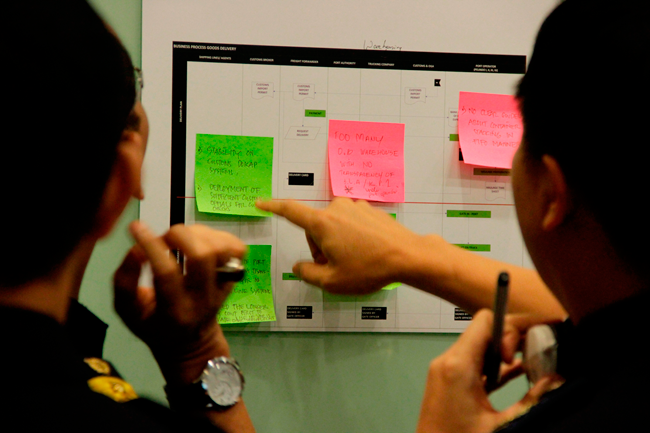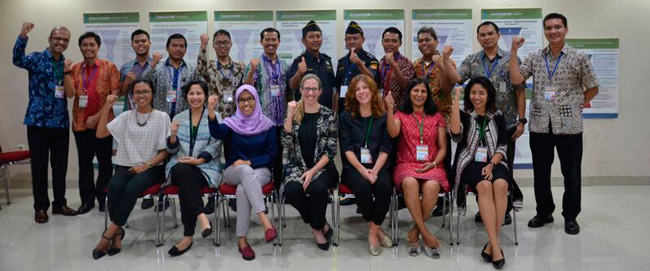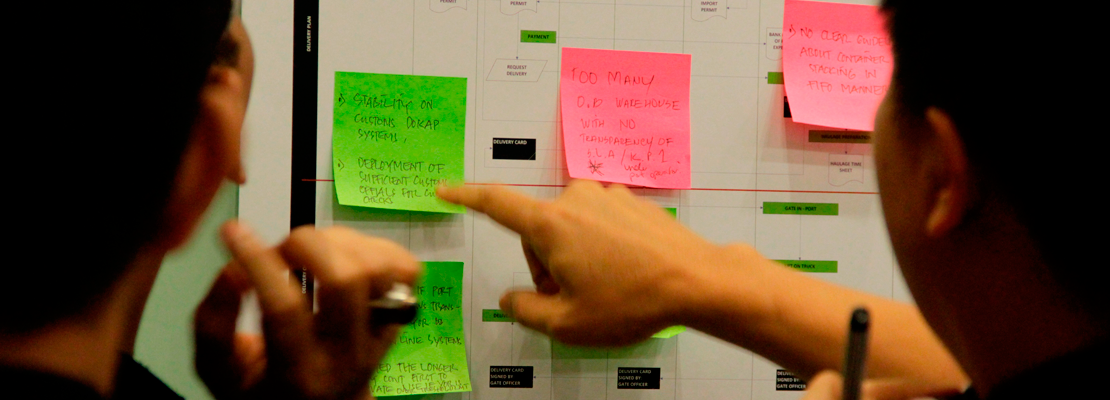Collective action to promote integrity in the maritime sector
20 June 2017
By Martin Benderson, Associate, BSR (Copenhagen)Companies operating in global supply chains face a number of systemic corruption issues, such as demands for ‘facilitation’ payments or extortion for bribes, when trading goods across borders. National anti-bribery legislation in many countries and extraterritorial regulations, such as the United States’ Foreign Corrupt Practices Act and the United Kingdom’s Bribery Act, have put pressure on international business to take a firm stance against corruption. However, any company that implements zero tolerance internal policies against bribery and facilitation payments risks losing business or facing delays unless their competitors institute similar policies. This ‘first mover’ disadvantage incentivizes companies to give bribes and facilitation payments instead of promoting a level playing field.
One approach that has emerged for companies to overcome such a stalemate is ‘collective action,’ which allows businesses to share information, coordinate actions, and engage governments and civil society without threatening their own competitive advantage and freedom to operate. Fortunately, a number of examples of collective action driven by businesses to tackle corruption have been initiated in recent years, with key public sector institutions such as Customs authorities playing a leading role.
One example of successful collective action is the Maritime Anti-Corruption Network (MACN). The network was established in 2011 as an industry-led initiative, working collaboratively toward the vision of a maritime industry free of corruption that enables fair trade to the benefit of society at large. It comprises vessel owners and other companies within the maritime industry, including cargo owners and service providers. MACN currently has over 85 member organizations and is governed by a member-elected steering committee. The network is facilitated by BSR – a global nonprofit business network and consultancy dedicated to sustainability.
Since its formation, MACN has worked to strengthen the anti-corruption programmes of its member companies by providing systems, tools, policies, and best practices to help them – in particular, captains arriving in a port – to say no to facilitation payments. By promoting good corporate practices in the maritime industry for tackling bribes and facilitation payments, MACN seeks to build a culture of integrity among its members, ultimately ensuring that all companies empower their captains to say no to demands for facilitation payments during port calls.
However, addressing only the behaviour of companies – the ‘supply side’ of corruption – is not sufficient to stop corruption in the maritime industry. Therefore, MACN actively engages and collaborates with government agencies to find ways to reduce the frequency and severity of demands for facilitation payments and bribe solicitations. Countries targeted are those where MACN members experience the greatest challenges, and where MACN finds the most viable opportunities to drive change in collaboration with local stakeholders, thanks to, for example, local political commitments to the anti-corruption agenda and to trade facilitation.
Fundamental to MACN’s collective action approach is that sustainable solutions to tackle corruption must be enabled by, supported by, and beneficial to key stakeholders. Dialogue with stakeholders is, therefore, a critical part of MACN’s collective action projects, securing commitment and buy-in from local stakeholders in specific countries and ports. Customs authorities are a key stakeholder in MACN’s collective action projects, as they play a central role in the clearance of goods through maritime ports worldwide.
To date, MACN has successfully partnered with Customs authorities in Nigeria and Indonesia to collaboratively implement a number of actions enhancing integrity and combating corruption risks in vessel and cargo clearance processes. The collective action projects implemented by MACN have demonstrated that a similar set of tools and approaches for improving transparency and integrity are relevant in all locations. Typical activities that MACN has implemented in partnership with Customs authorities include:
- undertaking risk assessments – conducting integrity risk assessment of vessel and cargo clearance processes in collaboration with key stakeholders;
- promoting good governance – developing transparent procedures and regulations for vessel and cargo clearance in collaboration with key stakeholders;
- building capacity – implementing integrity and awareness training for public officials and the private sector;
- promoting accountability – improving accountability in the maritime sector by developing accountability mechanisms, such as whistleblowing systems for public officials and the private sector;
- promoting public-private sector dialogue – promoting a culture of integrity and knowledge-sharing between government stakeholders and the private sector through multi-stakeholder dialogue and awareness raising.
In the sections below, two case studies from MACN´s collective action projects in Nigeria and Indonesia respectively are presented, illustrating the results achieved in countries where MACN is collaborating with Customs authorities.
Addressing corruption in the Nigerian port sector
MACN launched its first collective action project in Nigeria in partnership with the United Nations Development Programme (UNDP) in 2012. Nigeria had been identified as one of the most challenging countries to do business in, with requests for facilitation payments posing a major risk to member companies, involving cases of extortion and even threats of violence. MACN began with an integrity risk assessment in the port sector, identifying specific forms of corruption and its drivers, and possible solutions.
Key integrity risks for the Nigerian port sector included a lack of standard operating procedures, with officials wielding high discretionary powers, and weak infrastructure and capacity – both physical and procedural. Moreover, the assessment also identified bureaucratic ‘red tape’ in port operations as a potential bottleneck, creating ample opportunities for bribe solicitations: for instance, the study found that 142 signatures were required to process cargo at Lagos ports!
The integrity risk assessment exercise stressed the importance of participatory execution, and therefore recommended the training and certification of 70 local corruption risk assessors drawn from the public sector – at federal and state levels, and from relevant anti-corruption agencies – as well as from civil society.
Impact to date
MACN has successfully worked to implement the recommendations of the risk assessment, in collaboration with various stakeholders, including the Nigerian Shippers Council (NSC), the Nigeria Customs Service (NCS), the Technical Unit on Governance and Anti-Corruption Reforms (TUGAR), the UNDP, local non-governmental organizations (NGOs), and the Nigerian Ports Authority (NPA). The work to date has included best practice training workshops for Customs officials, the harmonization of procedures across ports, and the establishment of a grievance mechanism.
In addition, MACN supported the implementation by the NPA of an Electronic Ship Entry Notice (e-SEN) system that is expected to curb the corruption which characterized the manual system, and facilitated the implementation of a port sector accountability mechanism model hosted by the NSC, giving industry players and external stakeholders a reporting channel to escalate information about corruption demands. MACN plans to remain engaged in Nigeria, and to continue the successful collaboration established with the Nigeria Customs Service and other key stakeholders.
Building integrity in the Indonesian maritime sector
In 2015, MACN launched a collective action project in Jakarta with support from the UK’s Foreign and Commonwealth Office (FCO) and in partnership with three Indonesian authorities: the Directorate General of Customs & Excise; the Port Corporation Pelindo II; and the Corruption Eradication Commission (KPK).
MACN member companies had identified Indonesia as a corruption hotspot, noting that illicit facilitation demands were common and regulation ambiguous. Challenges like these motivated MACN to collectively take action. The project was also launched as a response to Indonesia’s stated ambition to build a more competitive maritime sector, and actively tackle corruption. This ambition helped the project to receive buy-in and support from local government stakeholders.
The project targeted the port of Tanjung Priok, which currently handles over 50% of Indonesia’s transhipment cargo. The objective being to improve regulatory transparency, and to address integrity risks in the cargo clearance process. In partnership with public sector stakeholders, MACN conducted an integrity risk assessment, identifying risks across the clearance process. Then, MACN and the public sector stakeholders established key recommendations for mitigating the identified risks and challenges.

Impact to date
Since 2016, MACN has been working with stakeholders to implement the recommendations from the risk assessment. The active support of Indonesia’s Directorate General of Customs & Excise and their willingness to take ownership of many of the recommendations has been critical to sustaining the project and delivering impact. Key actions to date include:
- upgrading the container tracking system to improve the transparency of container tracking and to limit human interaction when tracking goods;
- moving toward the elimination of cash payments in the export permit process to limit human interaction and opportunities for cash requests;
- raising awareness about and integrating whistleblowing reporting into the existing business processes of companies exporting goods;
- implementing ‘integrity champions’ training in partnership with Customs & Excise.
Stakeholders involved in the project report that the initiative has improved the transparency of regulation for cargo clearance, and has also improved dialogue between the public and private sector. MACN plans to remain engaged in Indonesia, due to the fact that it is becoming an important maritime trading partner, and as a result of the keen support for MACN´s work from the Directorate General of Customs & Excise and local stakeholders involved in the collective action initiative.

Call for action and collaboration
MACN´s collective action programme reflects a long-term commitment by MACN and its members to tackle corruption in the maritime sector in partnership with governments, civil society, and other businesses.
The network remains committed to pursuing its vision of a maritime industry free of corruption through a consistent, aligned, and collaborative approach between the public and private sector. Customs authorities will remain a key partner in helping MACN achieve its vision, and MACN is, therefore, keen to further expand and deepen engagements with Customs authorities across the globe.
If you are interested in learning more about how you can get involved in MACN’s collective action programme, please visit https://www.maritime-acn.org or send an email to macn@bsr.org.
More information
macn@bsr.org
